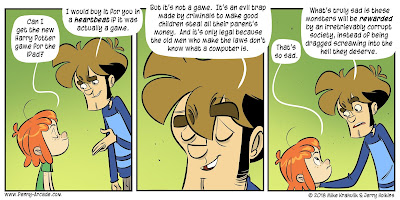This past Christmas I read a lot of posts from my friends about their kid's love of Harry Potter and their Harry Potter themed Christmas gifts. It is pretty awesome that they were able to have this shared interest. So when I read this past Penny Arcade comic, https://www.penny-arcade.com/comic/2018/04/30/hogwash, I was shocked and angered. This hits close to home: My friends might be experiencing this extortion. If the comic doesn't provide enough information (it didn't for me) then read (or skim) https://www.eurogamer.net/articles/2018-04-27-harry-potter-hogwarts-mystery-is-ruined-by-its-in-game-payments.
Summary: There is a scene in the game where the player (your child) is getting choked by a vine. They can either pay real money in order to stop it or wait for their energy to recharge (many minutes of watching their avatar get choked). And there are many other things like that.This comic strip is so spot on; panel 2, especially so. I've read several articles in the last few months calling for Computer Science to include ethics in more classes instead of the traditional capstone course on ethics. In the Jan 2019 issue of CACM, Moshe Vardi pointed out that more ethics in classes will be nice but that it won't change anything. The only thing that will force these companies to change is public policy -- regulation that bans these practices that target children. (Sorry, I have to say it for the sake of completeness.) If this stuff* matters to you then you need to write to your state representatives.
* stuff being any unethical practice being carried out via a computing device.
